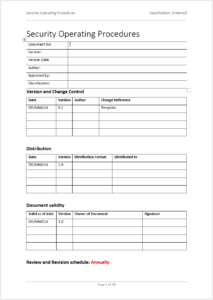A well-defined data retention policy is a vital component of any ISO 27001-compliant information security management system. It provides a structured approach to managing and disposing of data in a secure and compliant manner. By implementing an ISO 27001 data retention policy template, organizations can ensure that sensitive information is retained for the appropriate length of time and disposed of securely when it is no longer needed. This helps to protect the organization from legal, financial, and reputational risks.
The ISO 27001 standard provides a framework for organizations to develop and implement a data retention policy that meets their specific needs. The standard requires organizations to identify the types of data they need to retain, the duration for which it should be retained, and the method by which it should be disposed of. The policy should also include procedures for reviewing and updating the policy on a regular basis.
Key Components of an ISO 27001 Data Retention Policy
When creating a data retention policy that complies with ISO 27001, organizations should consider the following key components:
- Data Classification: Identify the different types of data that are subject to the policy and classify them based on their sensitivity and criticality.
- Retention Periods: Determine the appropriate retention period for each type of data, taking into account legal, regulatory, and business requirements.
- Storage Methods: Specify the methods by which data will be stored, such as on-premises, cloud-based, or a combination of both.
- Disposal Methods: Define the methods by which data will be disposed of when it reaches the end of its retention period. This may include secure deletion, physical destruction, or transfer to an archive.
- Review and Update: Establish a process for reviewing and updating the data retention policy on a regular basis to ensure that it remains effective and compliant with changing legal and regulatory requirements.
Benefits of Implementing an ISO 27001 Data Retention Policy
Implementing an ISO 27001 data retention policy offers several benefits to organizations, including:
- Improved Data Security: By establishing clear guidelines for data retention and disposal, organizations can reduce the risk of sensitive data being accessed or disclosed to unauthorized individuals.
- Reduced Legal and Regulatory Risks: By complying with legal and regulatory requirements for data retention, organizations can reduce the risk of fines, penalties, and other legal liabilities.
- Enhanced Data Governance: A data retention policy helps organizations to better manage and control their data, ensuring that it is accurate, reliable, and accessible when needed.
- Improved Business Efficiency: By regularly reviewing and updating the data retention policy, organizations can identify and eliminate unnecessary data, which can lead to cost savings and improved business efficiency.
Conclusion
In conclusion, an ISO 27001 data retention policy template provides a structured approach to managing and disposing of data in a secure and compliant manner. By implementing such a policy, organizations can protect themselves from legal, financial, and reputational risks, improve data security, and enhance data governance. Additionally, it can help organizations to reduce costs and improve business efficiency. Therefore, organizations that are serious about protecting their data and complying with ISO 27001 should consider implementing a data retention policy that aligns with the standard.
As the importance of data security continues to grow, organizations that want to demonstrate their commitment to protecting sensitive information should consider implementing an ISO 27001 data retention policy. By adhering to the requirements of the standard, organizations can ensure that their data is retained and disposed of in a secure and compliant manner.
FAQ
What is an ISO 27001 data retention policy template?
An ISO 27001 data retention policy template is a document that provides a structured approach to managing and disposing of data in a secure and compliant manner. It helps organizations to identify the types of data they need to retain, the duration for which it should be retained, and the method by which it should be disposed of.
What are the benefits of implementing an ISO 27001 data retention policy?
Implementing an ISO 27001 data retention policy offers several benefits to organizations, including improved data security, reduced legal and regulatory risks, enhanced data governance, and improved business efficiency.
What are the key components of an ISO 27001 data retention policy?
Key components of an ISO 27001 data retention policy include data classification, retention periods, storage methods, disposal methods, and review and update procedures.
